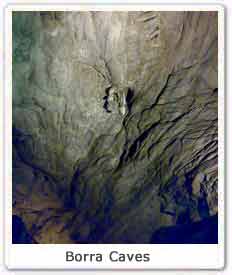Borra caves are situated at the distance of 90- 95 km from the city of Visakhapatnam. They are located at the height of 1450 feet above the sea level. They are spread in the Ananthagiri hill ranges of eastern ghats, which ranges between 800 to 1300 meters M.S.L. In Andhra Pradesh. November and December are considered as the best time to visit these caves.
 Borra
Cave Formation :
Borra
Cave Formation : Borra caves are the natural caves, that are said to have originated from the Gosthani river, which flows through these caves. The caves were created due to the flow of river over the limestone area. The pressure was exerted by the humic acid in the water on the mineral deposits and the limestone dissolved in the water. The dissolved limestone trickled down drop by drop forming the different shapes in the cave. These Borra caves spreaded over the one square km and are formed over the period of million of years.
Interior of the cave :
The opening of the cave measures upto 100 m horizontally and 75 m vertically. The cave is filled with stalagmite and stalactite formations. Visitors have given different names to the different shapes of these stalagmite and stalactite formations such as Shiv Parvathi, Mother child, Human brain, crocodile, Rushis Beard etc. Some more interesting structures inside the cave include mushroom formation, temple, church and many more. You may find here crystal white calcium stones in various forms. The Borra caves glitters and illuminates by the sixty three lamps of mercury, sodium vapour and halogen.
History of the Borra Caves :
The caves of Borra are said to be more than 150 years old. These wonder caves were discovered by the British geologist William King Gorge in the year 1807. The local tribals inhabitating in this area have a different story to tell. They say once a cowherd lost his cow while grazing. He soon realized that his cow had fallen down. He got worried, on looking down he found 60 feet deep hole, where he saw his cow was alive and feeding on the grass deep below. This was the time when the tribal has discovered the cave.
Religious Significance of the Borra caves :
These million year old Borra caves holds the great religious importance among the Hindus in India. Among the formations found in the cave, you may also find here 'Shivalingam' and the idol of the cow known as Kamadhenu.
Entry Fee :
The entry fee for the adults visiting the cave is Rs 25 and for the children is Rs 15. If you are interested in photography you may take the cameras along with yourself that may cost you Rs 10 and for the video cameras they will charge you Rs 100. The cave remains open to the tourists from 10 am to 5: 30 pm.
Sightseeing around the Borra Caves :
You can take a leisure walk around the Borra caves in the landscape of rugged and mountainous area. The area holds the rich flora and fauna. You can witness the limestone area where the cave is found is surrounded by the several mica mines. Trip to the Borra caves gives you the opportunity to enchant with the tribal people inhabitating in this area. On the excursion trip from the Borra caves tourists can make a visit to the Araku valley, which lies at the distance of 15 kms from the cave.






